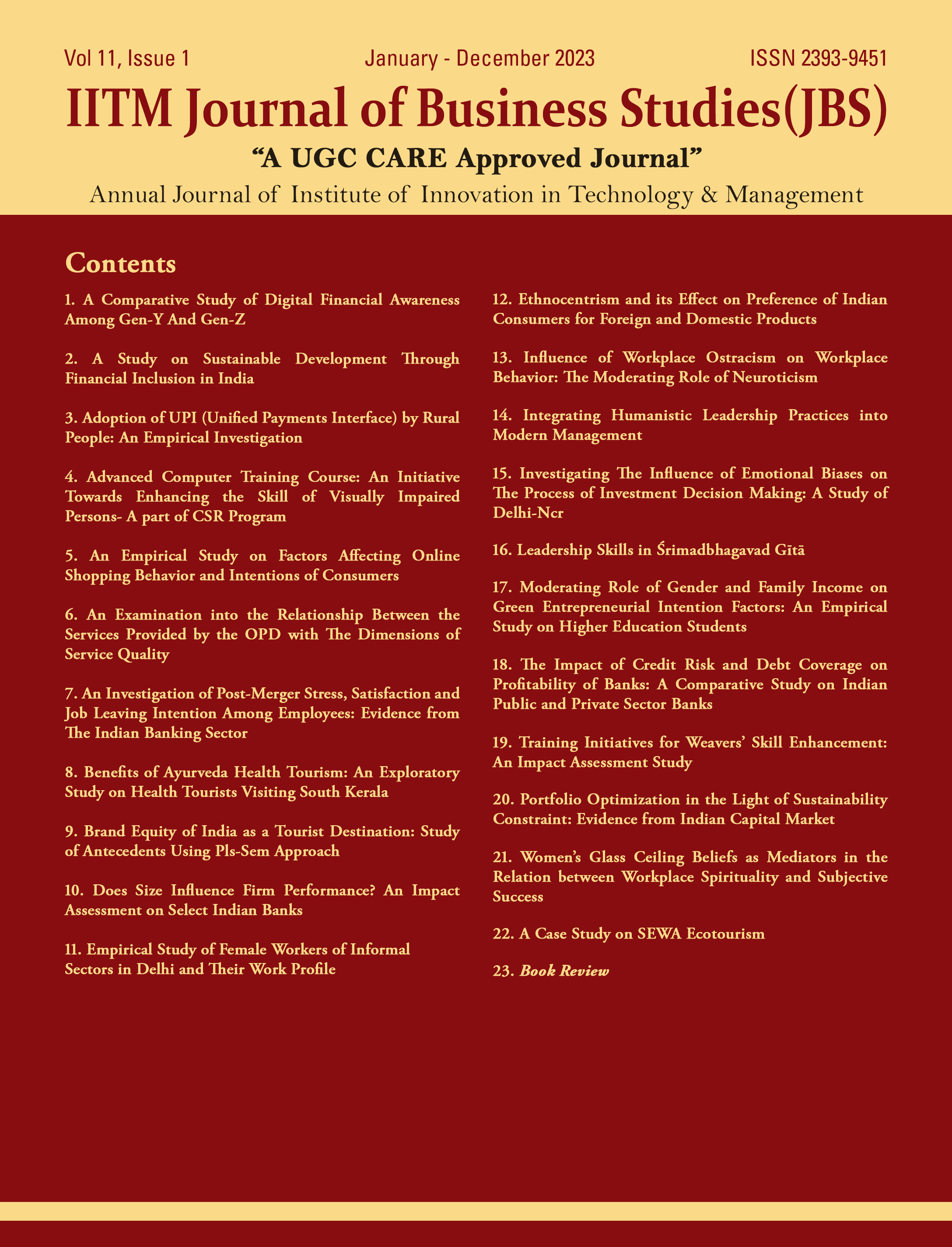PSYCHOLOGICAL CAPITAL AND OPTIMISM AS A PREDICTOR OF WORKPLACE HAPPINESS IN SERVICE-BASED INDUSTRIES IN INDIA
Keywords:
Optimism, Psychological capital, workplace happiness, motivationAbstract
Working in multinational corporations (MNCs), multicultural work environments present obstacles. In today’s tumultuous workplace, it’s more crucial than ever for businesses to ensure that their employees are happy and productive. This is because increasing production is dependent on employee contentment. The paper attempts to elucidate three critical factors that affect an organization’s corporate culture. The three factors that form the crux of the argument are Psychological Capital, optimism, and workplace happiness. The study was conducted on 101 employees from the service Industry. Both employee psychological capital and optimism are significantly related to greater work happiness within and across time. PsyCap and Optimism are strongly correlated with work place happiness. An employee who has an optimistic mindset can see, understand, and adapt things better as they can understand that the new initiative might bring something positive or modified. Conclusions and implications were discussed for the findings, and limitations were also discussed.
References
Arménio Rego, N. R. (2010). Perceptions of Organizational Virtuousness and Happiness as Predictors of Organizational Citizenship Behaviors. Journal of Business Ethics, Vol. 93, No. 2. 2. Avey, J. B. (2010). Impact of positive psychological capital on employee well-being over time. . Journal of occupational health psychology, 15(1), 17.
Avey, J.B., Reichard, R.J., Luthans, F. and Mhatre, K.H. (2011), “Meta-analysis of the impact of positive psychological capital on employee attitudes, behaviors, and performance”, Human Resource Development Quarterly, Vol. 22 No. 2, pp. 127-152, doi: 10.1002/hrdq.20070
Baron, K. M. (2009). Entrepreneurs' Optimism and New Venture Performance: A Social Cognitive Perspective. The Academy of Management Journal, Vol. 52(No. 3), 473-488.
Bitmiş, M.G. and Ergeneli, A. (2015), “How psychological capital influences burnout: the mediating role of job insecurity”, Procedia – Social and Behavioral Sciences, Vol. 207 No. 1, pp. 363-368, doi: 10.1016/j.sbspro.2015.10.106.
Cavus, M. F. (2015). Psychological capital: Definition, components, and effects. Journal of Education, Society and Behavioural Science, 244-255.
Dirzyte, A. (2009). Research on positivity and psychological capital at science and study institutions in the USA. MykolasRomerisUniversity.
Donald H., K. L. (2009). State or trait: effects of state optimism on job-related outcomes. Journal of Organizational Behavior, Vol. 30, No. 2.
Donaldson, S. I. (2010). Positive organizational psychology, behavior, and scholarship: A review of the emerging literature and evidence base. The Journal of Positive Psychology, 5(3), 177-191. 10. Fisher, C. D. (2010). Happiness at work. International Journal of Management Reviews, Vol. 12, 384–412.
Fred Luthans, Steven M. Norman,Bruce J. Avolio,James B. Avey. (2008). The Mediating Role of Psychological Capital in the Supportive Organizational Climate–Employee Performance Relationship. Journal of Organizational Behavior, 219–238.
Gupta, V. ( 2014). Employee Creativity: Mediating & Moderating Role of Psychological Capital. Indian Journal of Industrial Relations, Vol. 49, No. 4 .
Huang, H. (2016). Workplace happiness: Organizational role and the reliability of self-reporting. Doctoral dissertation.
Jensen, S. M. (2006). Relationship between entrepreneurs' psychological capital and their authentic leadership . Journal of managerial issues, 254-273.
Jensen, S. M. (2006). Relationship between entrepreneurs' psychological capital and their authentic leadership. . Journal of managerial issues, 254-273.
Lindström, K. (1994). Psychosocial criteria for good work organization. candinavian Journal of Work, Environment & Health, Vol. 20, Twentieth Anniversary Issue.
Luthans, F. ( 2006). Psychological Capital Development: Toward a Micro- Intervention. Journal of Organizational Behavior, Vol. 27, No. 3.
Luthans, F. (2002). The need for and meaning of positive organizational behavior. Journal of Organizational Behavior, 23(6), 695-704.
Luthans, Fred and Youssef-Morgan,C.M.(2017).Psychological Capital: An Evidence-Based Positive Approach, Management Department Faculty Publications. 165. https://digitalcommons.unl.edu/ managementfacpub/165
Lynn R. Kalnbach, B. M. (1997). The Effects of Optimism and Willingness to Trust on Work Related Attitudes and Behaviors: An Application to the Commercial Vehicle Industry. Department of Transportation.
Margaret H. Greenberg, D. A. ( (2006, October 10th).). Optimistic Managers & Their Influence on Productivity & Employee Engagement in a Technology Organization. ScholarlyCommons.
Monkevicius, A. (2014). Quality of Working Life Concept and Empirical Indicators. . Intellectual Economics. 8. 8-24. 10.13165/IE-14-8-1-01.
Ours, L. (2008). Job Satisfaction and Family Happiness: The Part-Time Work Puzzle. The Economic Journal, Vol. 118, No. 526, Features.
Seligman, M. (2002). Authentic happiness: Using the new positive psychology to realize your potential for lasting fulfillment. New York: New York Free Press.
Seligman, Martin & Csikszentmihalyi, Mihaly. (2000). Positive Psychology: An Introduction. . The American psychologist, 5-14.
Shahryar Sorooshian, J. O. (2018). Importance of Employer-Employee Relationship towards the Growth of a Business. Department of Civil and Environmental Engineering, Vol. 19(No. 166). 27. Shukla, S. C. (2014). Psychological Capital, LMX, Employee Engagement & Work Role Performance. Indian Journal of Industrial Relations, Vol. 50, No. 2.
Sousa, J. M. (2015). Happiness at work: Organizational values and person-organization fit impact. Retrieved from https://www.scielo.br/pdf/paideia/v25n61/1982-4327-paideia-25-61-0211.pdf : https:// doi.org/10.
Zetlin, M. (2013, Jan). Retrieved from optimistic lifestyle:. Retrieved June 5, 2020, from https://www. inc.com/minda-zetlin/train-yourself-to-be-an-optimist-4-steps.html:

